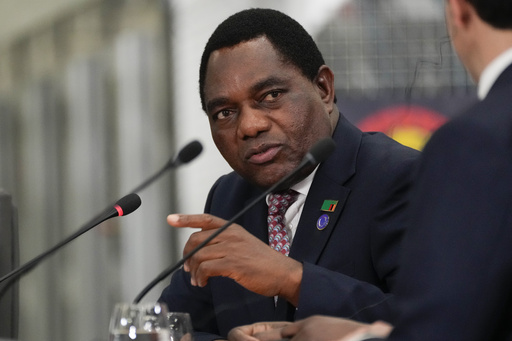LUSAKA, Zambia — In a captivating case that has caught the attention of many in Zambia, two men are facing charges related to witchcraft and possession of harmful charms aimed at the country’s president. This trial has not only evoked interest among the populace but has also highlighted lingering beliefs in magic and the supernatural that persist in certain areas of southern Africa, along with frustrations regarding a colonial-era law that criminalizes such practices in Zambia.
Gankhanani Moyo, a cultural heritage lecturer at the University of Zambia, expressed his disdain for the colonial legislation that tries to ban practices it fails to comprehend. He argues that this law does not acknowledge the complex nature of traditional African beliefs, asserting, “Traditional Zambian societies and individuals believe in a strong relationship between the human world and the supernatural.” The case has also become intertwined with a political narrative, as prosecutors allege that the accused were hired by a fugitive brother of former lawmaker Emmanuel Banda to enact a curse on President Hakainde Hichilema, who is preparing for an upcoming election.
There are skeptics who dismiss the entire situation as a political maneuver by Hichilema, who has yet to make any comments regarding the trial. A column published in the Lusaka Times provocatively questioned whether witch doctors and so-called witches would be allowed to testify as expert witnesses.
In a society where many including politicians have admitted to consulting supernatural forces for enhancement in their positions, the validity of such beliefs remains potent. Hichilema himself faced accusations of practicing witchcraft from the late President Michael Sata, who claimed that magic originating from Hichilema’s home region possessed significant power—a claim the president never addressed over a decade ago.
The arrests of the two men in question occurred in December in a hotel in Lusaka after a cleaner reported unusual sounds. Upon investigation, police discovered a bottled chameleon along with other items deemed peculiar, like a mysterious white powder, a red cloth, and an unidentified animal’s tail. The accused are also facing charges relating to animal cruelty. One suspect reportedly admitted to being hired to curse the president, claiming they were promised a reward exceeding $1 million.
The depth of public interest in the case can be attributed to the prevalence of belief in witchcraft in Zambia, as emphasized by Enoch Ngoma, a veteran journalist who has reported on numerous similar trials. Initially, the judiciary planned to broadcast the trial live—a rare occurrence in the country—but later reversed this decision following opposition from various stakeholders, including the influential Council of Churches in Zambia.
A significant number of traditional beliefs coexist alongside Christianity in Zambia. According to a 2018 study conducted by the Zambia Law Development Commission, 79% of Zambians expressed belief in witchcraft. This research played a role in examining the relevance of the Witchcraft Act, which was established in 1914 while Zambia was still under British influence. It outlines witchcraft as any pretension of supernatural capability intended to invoke fear or harm.
Prosecuting witchcraft cases in Zambia often proves challenging due to the complexities involved in gathering evidence. Typically, such cases are heard in traditional courts, making this instance notable for reaching the magistrates’ court in Lusaka. The penalties for practicing witchcraft can include fines or imprisonment for up to two years, potentially accompanied by hard labor.
In conjunction with the difficulties of prosecution, witchcraft also presents business opportunities. Rodwell Vongo, known as Dr. Vongo, is a traditional healer and the president of the Zambian Traditional Healers Association. While he acknowledges that he would be labeled a witch doctor under the law, he finds the term to be pejorative. Residing in a well-off neighborhood of Lusaka, he serves a diverse, middle-class clientele—contrary to the perception that such beliefs are confined to rural communities. Most of his customers are women seeking charms for marital happiness, while others seek safeguards against witchcraft.
Wisdom Kaunda, a local teacher following the witchcraft trial closely, reflected on its potential implications for Zambian society. “I personally feel people should be punished for planning to cause harm to someone,” he stated, though he acknowledged the inherent difficulties of proving witchcraft in a court of law.


